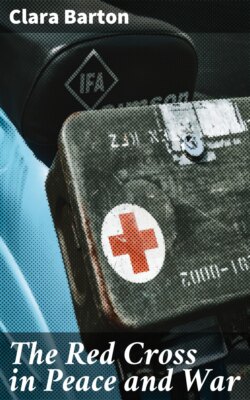Читать книгу The Red Cross in Peace and War - Barton Clara - Страница 7
На сайте Литреса книга снята с продажи.
ORGANIZATION AND METHODS OF WORK.
ОглавлениеTable of Contents
One of the things considered indispensable, and therefore adopted as a resolution by the Conference of 1863, was the centralization of the work in each country separately by itself.
While the treaty must be universally acknowledged and its badge accepted as a universal sign, it was equally essential that the societies of the different countries should be simply national and in no respect international. It was therefore ordained by the conference that all local committees or organizations desirous of working with the Red Cross, should do so under the auspices of the Central Committee of their own nation, which is recognized by its government and also recognized by the International Committee from which the sign of the Red Cross emanates. Singularly enough, the International Committee has had considerable difficulty in making this fully understood, and frequently has been obliged to suggest to local committees the necessity for their subordination to the Central or National Committee. Once in three months the International Committee publishes an official list of all central committees recognized by it as national. In this way it is able to exercise a certain control, and to repress entanglements and abuses which would become consequent on irresponsible or counterfeit organizations. To recapitulate: the Commission of Geneva, of which M. Moynier is president, is the only International Committee. All other committees are simply national or subordinate to national committees. The Conference of 1863 foresaw that national differences would prevent a universal code of management, and that to make the societies international would destroy them, so far as efficiency was concerned. They therefore adopted a resolution that “Central committees should organize in such a manner as seemed the most useful and convenient to themselves.” Every committee being its own judge, has its own constitution and laws. To be efficient, it must have the recognition of its own government, must bear the stamp of national individuality and be constructed according to the spirit, habits and needs of the country it represents. No hierarchy unites the national societies; they are independent of each other, but they have each an individual responsibility to the treaty, under the ensign of which they work, and they labor in a common cause. It is desirable that they should all be known by one name, namely, the Society of the Red Cross. The functions of the International Committee, whose headquarters are at Geneva, were also determined by the Conference of 1863. It is to serve provisionally as an intermediate agent between national committees, and to facilitate their communications with each other. It occupies itself with the general interests of the Red Cross in correspondence, and the study of theoretical and practical methods of amelioration and relief.
The national committees are charged with the direction and responsibility for the work in their own countries. They must provide resources to be utilized in time of need, take active measures to secure adherents, establish local societies, and have an efficient working force always in readiness for action, and in time of war to dispatch and distribute safely and wisely all accumulations of material and supplies, nurses and assistants, to their proper destination, and, in short, whatever may be gathered from the patriotism and philanthropy of the country. They must always remember that central committees without abundant sectional branches would be of little use.
In most countries the co-operation of women has been eagerly sought. It is needless to say it has been as eagerly given. In some countries the central committees are mixed, both sexes working together; in others, sub-committees are formed by women, and in others, such as the Grand Duchy of Baden, woman leads.
As a last detail of organization, the Conference of 1863 recommended to the central committees to put themselves en rapport with their respective governments, in order that their offers of service should be accepted when required. This makes it incumbent upon national societies to obtain and hold government recognition, by which they are endowed with the immunities and privileges of legally constituted bodies and with recognition from other nations in time of war, not otherwise possible to them.
